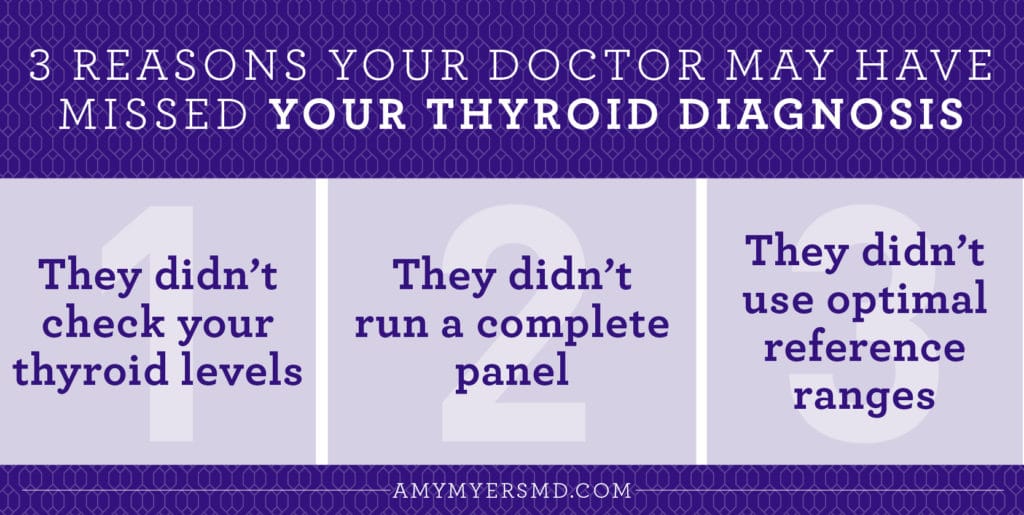As I explain in my book, The Thyroid Connection, we are in the midst of a thyroid epidemic, with around 27 million Americans facing some sort of thyroid dysfunction. Women are up to eight times more likely to be diagnosed with a thyroid condition than men, and 60% of those living with thyroid dysfunction are unaware they even have an issue.1
You may be one of them. Do you struggle with fatigue, brain fog, weight gain, constipation, mood imbalances, or cold hands? And have you visited your doctor only to be brushed off or told that you’re fine? Do you wonder, “What’s wrong with me?”
Unfortunately, this is all too common in conventional medicine. It’s often an undiagnosed thyroid condition called Hashimoto’s behind your symptoms. In fact, Hashimoto’s is the leading cause of hypothyroidism in the U.S.2
Let me tell you a story that may sound familiar.
When Susannah first came into my office with complaints of exhaustion, depression, and weight gain, she had already seen three different doctors who could not accurately diagnose or treat her condition. “They kept telling me I was fine because my labs were normal,” Susannah told me. “But I can’t be okay if I’m feeling like this!”
I saw countless patients in Susannah’s situation whose doctors brushed off their symptoms as stress, age-related, or simply “women’s issues,” and as I dove into their medical history and ran a complete thyroid panel I determined that it was indeed Hashimoto’s they were dealing with.
After reviewing Susannah’s medical records, I saw the problem. Each of her doctors only looked at part of her condition. The blood tests they ran showed Susannah’s thyroid hormone levels to be within the normal range, yet those tests did not tell the full story. She did have thyroid dysfunction—her doctors simply could not see it in the labs they ordered. So even if your doctor tells you that your thyroid levels are normal, you could very well have Hashimoto’s.
In this article, we’ll take a look at signs you’re dealing with Hashimoto’s, and the reasons why your doctor may have missed your diagnosis.
What is Hashimoto’s?
Your thyroid produces hormones that help regulate nearly all of your bodily functions, including metabolism, heart rate, body temperature, menstrual cycles, and cholesterol levels.34 Hashimoto’s is an autoimmune disorder in which your immune system creates antibodies that attack your thyroid gland, causing hypothyroidism, which is when your thyroid under produces its hormones.
When this occurs, all of your metabolic processes slow down, leading to a whole range of symptoms, including:
- Fatigue and exhaustion, even after sleeping 8-10 hours
- Brain fog, difficulty concentrating, poor memory
- Weight gain or inability to lose weight
- Cold hands or feet, low body temperature
- Hair loss or thinning, brittle hair
- Constipation
- Hormonal imbalances including PMS, irregular periods, and low sex drive, infertility
- Dry skin or brittle nails
- Mood imbalances such as anxiety, depression, and mood swings
- Decreased heart rate
- Neck swelling, snoring, or hoarse voice
Developing thyroid dysfunction is much more likely for those who already have a preexisting autoimmune condition, so it’s important to get tested if you have this risk factor or any of the other signs you may have Hashimoto’s.5
3 Reasons Your Doctor Missed Your Thyroid Diagnosis
If you are one of the millions of patients yet to receive an accurate diagnosis of underlying thyroid dysfunction or thyroid disease, it could be that your doctor simply did not run the proper tests. Here are 3 reasons why.
 Dr. Amy Myers
February 10th, 2018
https://content.amymyersmd.com/article/dr-missed-hashimotos-diagnosis/3 Reasons Your Doctor Missed Hashimoto’s – Infographic – Amy Myers MD®
Dr. Amy Myers
February 10th, 2018
https://content.amymyersmd.com/article/dr-missed-hashimotos-diagnosis/3 Reasons Your Doctor Missed Hashimoto’s – Infographic – Amy Myers MD®1. They didn’t check your thyroid levels
The symptoms of Hashimoto’s can be vague, leading doctors to brush them off as “women’s issues,” stress, aging, or related to some other disease. Conventional doctors typically don’t start checking your thyroid levels until you’re in your 40s or 50s, so if you’re in your 20s or 30s, they probably assume your symptoms are part of another condition such as fatigue caused by iron deficiency. If you’re a man, they might not check your thyroid levels at all since men are considered to be at low risk for thyroid dysfunction. On top of that if you have another autoimmune disease, your doctor might focus on the one condition as the source of your symptoms and not check your thyroid levels as a result.
2. They didn’t run a complete panel
Maybe your doctor did run a thyroid test and declared your thyroid levels normal, even though uncomfortable symptoms persist. Chances are, your doctor did not run a complete panel. Most conventional doctors only check your Thyroid Stimulating Hormone (TSH), which is considered the go-to test for the diagnosis and treatment of thyroid dysfunction. 6 However, measuring TSH levels alone does not tell the whole story, and the results can often be confusing. For a more accurate diagnosis, you also want to check your Free T4, Free T3, and Reverse T3 hormone levels.
Here’s an overview of what each one measures:
- Free T4 – The Storage Form: T4 is the thyroid’s primary output. T4 is an inactive form of thyroid hormone that gets stored in your body’s tissues so that it’s ready to use when needed. I like to measure Free T4 (FT4) because it shows how much T4 is still circulating in the bloodstream and available to act in the body.
- Free T3 – The Gas: Free T3 (FT3) is the active form of thyroid hormone. When each local area of your body determines it needs more energy, it converts the storage form of T4 into FT3. These hormones attach to receptors inside of your cells to power your metabolic processes, so I like to think of them as the gas. It is vital to measure your FT3 levels because your body might not be converting T4 to FT3 very well. This is one of the most common causes of hypothyroidism symptoms I see in my practice.
- Reverse T3 – The Brakes: Your body uses a portion of the T4 to create Reverse T3 (RT3), which attaches to the receptors for FT3 in order to slow down your metabolic processes. For that reason, I call RT3 the brakes. If RT3 levels are high, you are likely converting too much T4 to RT3 and not enough to FT3. This can cause hypothyroid symptoms even if your TSH and T4 levels are optimal.
- TPOAb and TgAb – Antibodies: In addition to checking your thyroid hormone levels, there are also two main types of thyroid antibodies that your doctor should check for. Thyroid peroxidase antibodies (TPOAb) attack the enzyme responsible for synthesizing thyroid hormones, and thyroglobulin antibodies (TgAb) attack thyroglobulin, which your thyroid uses to produce its hormones. In patients with Hashimoto’s disease, both TPOAb and TgAb levels are elevated. Determining whether you have Hashimoto’s, as opposed to just an underactive thyroid, is key because once you have one autoimmune condition, you are three times as likely to develop another.
I recommend ordering all of the thyroid tests listed below for obtaining a full picture of a patient’s thyroid health.
- TSH
- Free T4
- Free T3
- Reverse T3
- Thyroid Peroxidase Antibodies (TPOAb)
- Thyroglobulin Antibodies (TgAb)
In my book The Thyroid Connection, I go into more detail of what these tests measure and how to interpret the results.
3. They didn’t use optimal reference ranges
Okay, so you finally got your doctor to order the full range of thyroid tests, and your results still do not indicate Hashimoto’s or thyroid dysfunction. This is because many doctors rely on “normal” reference ranges, which are too broad and often produce unreliable results. After the lab reference ranges for a healthy thyroid was created, they discovered that they included people who already had thyroid dysfunction! In 2003, the American Association of Clinical Endocrinologists recommended narrower lab reference ranges, yet even now many doctors and laboratories have not updated their practices.
In my experience, I found the following reference ranges to be optimal for my patients and myself:
- TSH 1-2 UIU/ML or lower (Armour or compounded T3 can artificially suppress TSH)
- FT4 >1.1 NG/DL
- FT3 > 3.2 PG/ML
- RT3 less than a 10:1 ratio RT3:FT3
- TPOab and TgAb < 4 IU/ML or negative
Using these guidelines—and listening to your body—ensures you are getting the most accurate information about your thyroid health and your medication needs. I’m acutely aware of how important it is to support your thyroid health because I also have a thyroid condition. If you are newly diagnosed with low thyroid, hypothyroidism, or Hashimoto’s Disease, The Myers Way® Multivitamin is a good way to support your body. Everyone should take a high-quality multivitamin every day, and it’s particularly important for those with thyroid issues because multis are packed with micronutrients in the forms your body wants, and the amounts your thyroid needs. I custom formulated The Myers Way® Multi it to contain the highest quality blend of vitamins and minerals for promoting optimal health. In fact, with optimal levels of thyroid-supporting minerals such as zinc, selenium, and iodine, alongside antioxidants including vitamins C and E and other free radical scavengers, no other multi on the market does more to support your thyroid.
Article Sources
- https://www.thyroid.org/media-main/press-room/.
- https://www.thyroid.org/hashimotos-thyroiditis/.
- https://www.webmd.com/women/hashimotos-thyroiditis-symptoms-causes-treatments#1.
- https://www.endocrineweb.com/conditions/thyroid-nodules/thyroid-gland-controls-bodys-metabolism-how-it-works-symptoms-hyperthyroi.
- https://www.endocrineweb.com/conditions/hashimotos-thyroiditis/risk-factors-hashimotos-thyroiditis.
- https://www.endocrineweb.com/conditions/hashimotos-thyroiditis/hashimotos-thyroiditis-diagnosis.
